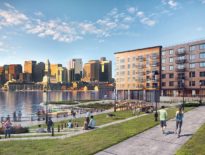Last week, Google announced to some acclaim it would spend $1 billion to build 15,000 market-rate and 5,000 affordable homes in the housing-starved San Francisco Bay area. Before any like-minded Massachusetts actors get a similar idea, we suggest a better use of that money would be helping efforts to modernize our mass transit and suburban zoning laws.
“As we work to build a more helpful Google, we know our responsibility to help starts at home. For us, that means being a good neighbor in the place where it all began over 20 years ago: the San Francisco Bay Area,” Google CEO Sundar Pachai wrote in statement announcing the 10-year initiative.
It’s true the tech industry has played a role in Bay Area home prices’ meteoric rise in recent years, helping cause a tremendous economic boom and drawing thousands of new residents.
But the biggest culprit, as in Boston, has been an enormous shortfall in housing production in the city of San Francisco and its suburbs, driven by restrictive municipal zoning.
Setting aside questions of motivation – Pachai has said the new units will be open to the public, not just its employees – were one of the corporate giants or large universities that form Massachusetts’ own economic engine to decide they needed to spend $1 billion to help fix the local housing market, they would do better to spend it on a campaign to reform local zoning and raise more revenues for the MBTA and other transit agencies.
As we have noted in this space many times, most recently on June 10, Massachusetts municipalities’ land use policies are the biggest cause of our housing crisis. Many towns have created a “paper wall” of laws and regulations that prevents developers from even considering much-needed multifamily development, as the landmark Dain Report documented thoroughly.
A concerted, well-funded campaign that advanced a pro-housing agenda and backed local candidates who want to cut some of the red tape that raises development costs – and therefore rents and prices – would allow market forces to meet the much of the demand that exists now at lower price points than are currently feasible. Establishing feasible by-right zoning for smaller infill developments and sensible, low-impact conversions of existing single-family houses into multifamily structures across much of Metro Boston is crucial to our economy’s future.
Likewise, a big drive to support transformative public transit investments and the candidates who back them would enable economic development and housing demand to spread more evenly throughout Greater Boston and the state and enable housing to be built on land that isn’t prohibitively expensive.
But, isn’t all of this dreaming moot? If the last 20 years have not encouraged any institutional actor to create a deus ex machina to rescue us from our housing crisis, nothing will. That means the onus falls on all of us to get involved, and be our own saviors.






